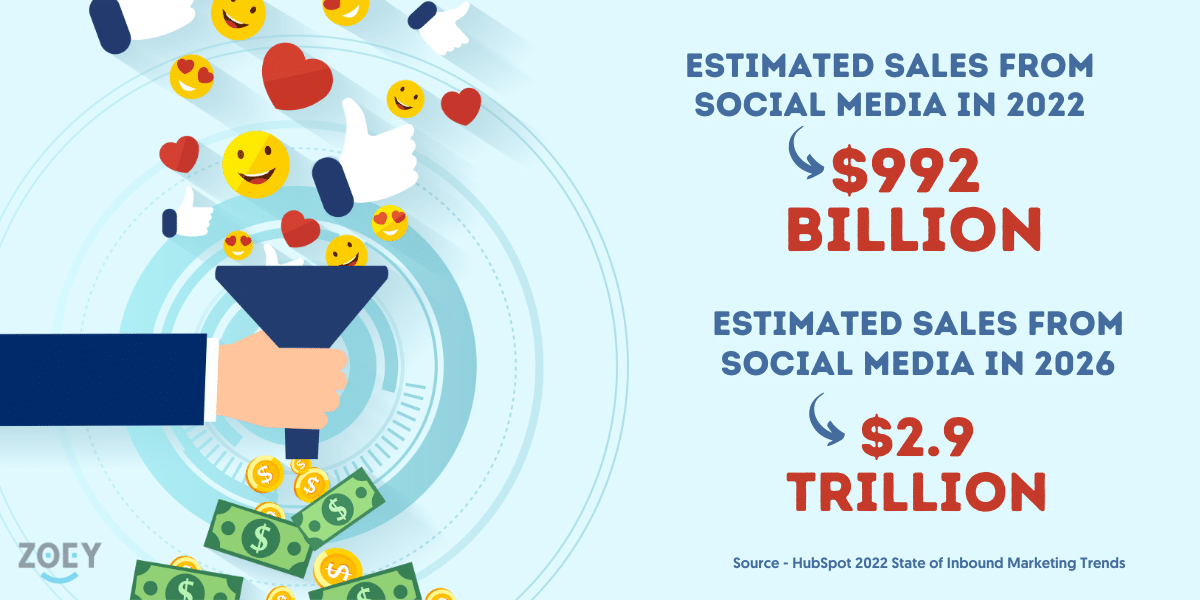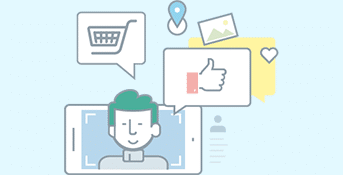
As Ecommerce continues to grow and evolve, social media has become essential for businesses to reach and engage with their audience. In 2022, social media accounted for $992 billion in global sales, and by 2026, analysts anticipate that number will reach $2.9 trillion.
B2B and B2C social media marketers might use social media platforms differently. B2C social media campaigns can increase direct sales, while B2B campaigns increase brand and product awareness, leading to sales with distributors. Social media goals for B2B marketers should focus on longer-term business objectives such as:
- Creating brand awareness
- Building trust and credibility
- Educating followers and their target audiences
Is your company business actively promoting your products or services on social media? These social media strategies can help boost your B2B Ecommerce sales.

Choose the right social media platform for your products and services.
Social media is currently the top marketing channel for 44% of B2B marketers, according to HubSpot’s 2022 State of Inbound Marketing Trends Report.
However, each social media platform appeals to a different audience and the success on these platforms can vary. For example, food, technology, fashion, entertainment, and beauty products perform well on Instagram, while news, technology, B2B products and services, and entertainment products are more successful on Twitter.
TikTok has become a hub for entertainment, food, beauty tutorials, and fashion trends. At the same time, Facebook is suitable for B2B products and services, education, and travel-related products and services.
For B2B Ecommerce businesses, LinkedIn is useful if you are targeting decision-makers. Almost 16 million LinkedIn users own a business or occupy senior C-suite positions within their organizations.
Create engaging content that promotes your brand.
Social media is all about engagement, so creating engaging, informative, and relevant content for your audience is important. This could include blog posts, infographics, videos, and more. Ensure your content is optimized for each platform, considering character limits and image sizes. If video is a part of your sales strategy, consider YouTube and Instagram. HubSpot’s 2022 video marketing survey found that Instagram produces the highest ROI for video content.
Share your customer’s success stories.
A very effective way to build credibility and trust with potential customers is to share success stories from existing clients. This could be in the form of case studies or testimonials. Tag and thank the customers who share their stories, as this can help build loyalty and encourage others to share.
Use social media as an extension of your customer service.
Social media can be a good tool for customer service, allowing customers to quickly and easily connect with your team. Respond promptly to any inquiries or complaints, and consider using chatbots or automated responses to handle common questions.
Set aside a budget for social media advertising.
Paid social media advertising can be a powerful way to reach larger audiences and drive sales. Consider using targeted ads on platforms like LinkedIn or Twitter and retargeting ads to reach customers interested in your products or services.
Monitor your social media analytics regularly.
Make sure to regularly monitor your social media analytics to track your progress and identify areas for improvement. Pay attention to metrics like engagement rates, follower growth, and click-through rates, and use this data to refine your social media strategy over time.
Ensure that your ecommerce website is ready for orders.
While social media is a valuable tool for promoting and selling products, it should be viewed as a supplement to an ecommerce website rather than a replacement. By directing your followers to your website, you can provide them with more information about your products or services, showcase your expertise in your industry, and establish yourself as a trusted source.
Zoey’s customers benefit from an ecommerce platform that allows them to build a customized Ecommerce website that provides B2B customers with a trustworthy shopping experience. Zoey’s customer relationship management (CRM) can help ecommerce businesses automate their inbound customer acquisition by streamlining their online sales, providing valuable insights into customer behavior, personalizing communication, improving customer service, and efficiently managing their inventory.
By choosing the right Ecommerce platform, optimizing your social media profiles, creating engaging content, sharing customer success stories, providing excellent customer service, leveraging advertising, and monitoring your analytics, you can create a solid social media strategy that helps you reach your business goals.
If you have yet to use Zoey’s platform, you can request a demo and see how our platform can help you achieve your goals while driving growth and success for your business.
Data or Statistics resources: HubSpot’s 2022 State of Inbound Marketing Trends Report, HubSpot’s 2022 video marketing survey





